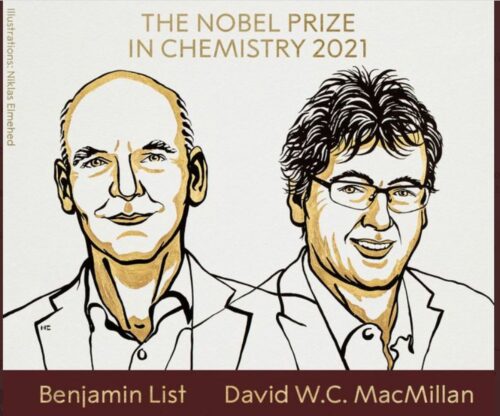The chemistry of molecule-making is quite particular: sometimes, a reaction produces two mirrored versions of a molecule, but only one remains sufficient for a given application. In processes such as drug development, using the wrong mirror image can have devastating biological effects. Some catalysts can speed up a chemical reaction while producing one mirror version preferentially over the other. Historically, these catalysts have been made with toxic metals. But the 2021 Nobel Prize in Chemistry was awarded to two scientists—Benjamin List of the Max-Planck Institute for Coal Research and David MacMillan of Princeton University— who developed organic catalysts that are mirror image-selective, helping to make reactions more environmentally friendly.
List discovered that the amino acid proline could replace the function of metal catalysts while producing the more favored mirrored version of a molecule. At the same time, MacMillan designed small organic molecules that, like proline, had catalytic functions and could generate one mirrored version of a molecular product over the other. MacMillan officially coined the term for this process: “asymmetric organocatalysis.”
This method of catalysis is eco-friendly: it decreases the need to use toxic metals as catalysts and also decreases the time of reaction. Approximately thirty-five percent of the world’s gross domestic product depends on catalysis, so the creation of a more efficient and environmentally sustainable tool has major benefits. Production of the preferred mirrored version through organocatalysis has revolutionized the field of chemistry, one reaction at a time.

